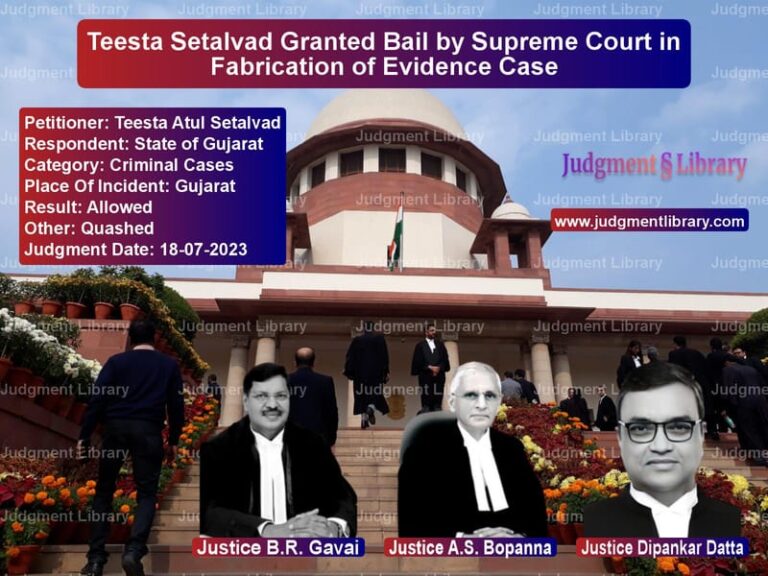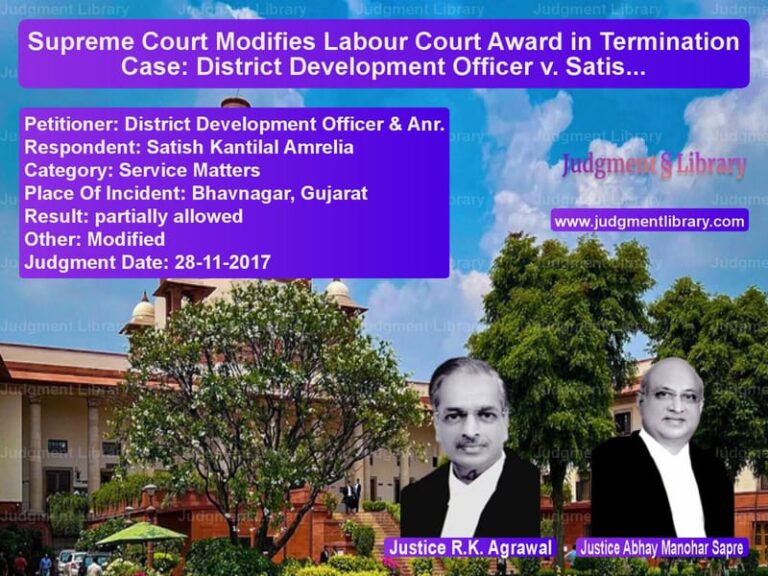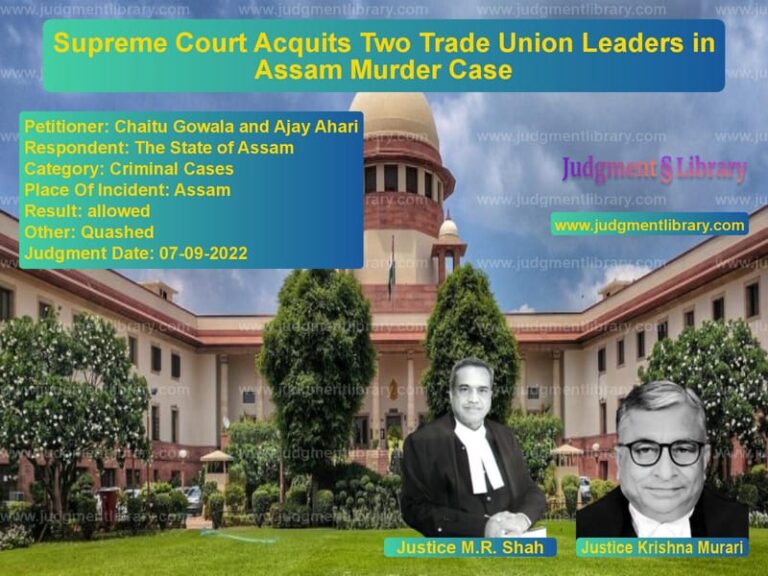Supreme Court Grants Probation to Convicts in Theft Case Under IPC Section 379
The Supreme Court of India recently ruled in Som Dutt & Others vs. State of Himachal Pradesh, allowing the appellants to be released on probation of good conduct despite their conviction under Section 379 read with Section 34 of the Indian Penal Code (IPC). The judgment modifies the sentencing decision while maintaining the conviction, offering the appellants an opportunity to reform rather than serve a prison term.
The ruling highlights the Court’s discretion in granting probation under the Probation of Offenders Act, 1958, and the Code of Criminal Procedure (CrPC). It also underscores the principle that individuals with no prior criminal record should be given a chance to rehabilitate, particularly when the offense does not involve serious violence or harm.
Background of the Case
The case dates back to September 18, 2008, when a police patrol in Dungru Nallah, Himachal Pradesh, intercepted a red Indigo car without a number plate. The car was driven by Manoj Kumar alias Manoj Kaushal (since deceased), with Bula Ram as a passenger. The police also stopped a tractor with a trolley, driven by Daleep Kumar, with Som Dutt and Ranjan Kumar as passengers.
Upon inquiry, Som Dutt claimed ownership of the tractor, while the vehicle documents were found with Bula Ram. However, discrepancies in the registration numbers led the police to suspect foul play. Following an investigation, an FIR was registered against all five accused under Section 379 IPC (theft) read with Section 34 IPC (common intention). The Judicial Magistrate, First Class, Karsog, convicted all accused and sentenced them to three months of simple imprisonment along with a fine.
Petitioners’ Arguments
The appellants, represented by legal counsel, contended that:
- They had no previous criminal record, making them eligible for probation under Sections 3 and 4 of the Probation of Offenders Act, 1958.
- The trial court and appellate court failed to consider alternative sentencing options such as probation.
- The conviction itself was not challenged, but the sentencing decision needed reconsideration in light of their clean background.
- They were willing to furnish personal bonds and abide by conditions imposed for their probation.
Respondent’s Arguments
The State of Himachal Pradesh, represented by its legal counsel, countered with the following arguments:
- The appellants had been convicted after due legal process, and their guilt had been established beyond a reasonable doubt.
- Granting probation should be approached cautiously, particularly in cases involving property crimes.
- However, the State did not strongly oppose the plea for probation, acknowledging that the appellants had no prior convictions.
Supreme Court’s Judgment
The Supreme Court bench, comprising Justices Sanjiv Khanna and Bela M. Trivedi, ruled in favor of the appellants and allowed them to be released on probation. The key observations made by the Court were:
Read also: https://judgmentlibrary.com/supreme-court-modifies-conviction-in-uttar-pradesh-murder-case/
- Discretion in Granting Probation: The Court reaffirmed that under Sections 3 and 4 of the Probation of Offenders Act, 1958, and Sections 360 and 361 CrPC, courts have the discretion to release convicted individuals on probation based on their conduct and antecedents.
- Absence of Criminal History: The Court noted that since the appellants had no previous criminal record, their case was fit for probation.
- Sentencing with Reformative Intent: The judgment emphasized that the criminal justice system should aim at rehabilitation wherever possible, particularly for first-time offenders.
- Maintaining the Conviction: While the conviction under Section 379 IPC remained intact, the sentence was modified to allow probation.
- Probation Conditions: The Court directed that each appellant must furnish a personal bond of Rs. 25,000 with surety of the like amount and provide an undertaking to maintain peace and good behavior for three years.
- Consequences of Non-Compliance: If the appellants fail to adhere to the probation terms, they will be required to serve the original sentence imposed by the trial court.
Implications of the Judgment
This ruling has significant implications for criminal law and sentencing:
- Encouraging Rehabilitation: The decision promotes the idea that first-time offenders should be given a chance to reform rather than being incarcerated.
- Judicial Discretion in Sentencing: The judgment highlights the importance of individualized sentencing that considers the offender’s background and the nature of the offense.
- Precedent for Probation Cases: The ruling sets a strong precedent for other cases where minor property offenses are involved.
- Alternative Sentencing Approach: It reinforces the idea that non-violent offenses do not always warrant jail time and that courts should consider probation where appropriate.
Conclusion
The Supreme Court’s ruling in Som Dutt & Others vs. State of Himachal Pradesh is a landmark decision that underscores the importance of balancing justice with reformative approaches. By granting probation instead of a jail sentence, the Court has reinforced the principle that first-time offenders deserve a chance to rehabilitate. The judgment serves as a guiding principle for lower courts to exercise their discretion judiciously in similar cases.
Petitioner Name: Som Dutt & Others.Respondent Name: State of Himachal Pradesh.Judgment By: Justice Sanjiv Khanna, Justice Bela M. Trivedi.Place Of Incident: Himachal Pradesh.Judgment Date: 04-04-2022.
Don’t miss out on the full details! Download the complete judgment in PDF format below and gain valuable insights instantly!
Download Judgment: som-dutt-&-others-vs-state-of-himachal-pr-supreme-court-of-india-judgment-dated-04-04-2022.pdf
Directly Download Judgment: Directly download this Judgment
See all petitions in Bail and Anticipatory Bail
See all petitions in Custodial Deaths and Police Misconduct
See all petitions in Theft and Robbery Cases
See all petitions in Judgment by Sanjiv Khanna
See all petitions in Judgment by Bela M. Trivedi
See all petitions in allowed
See all petitions in Modified
See all petitions in supreme court of India judgments April 2022
See all petitions in 2022 judgments
See all posts in Criminal Cases Category
See all allowed petitions in Criminal Cases Category
See all Dismissed petitions in Criminal Cases Category
See all partially allowed petitions in Criminal Cases Category







